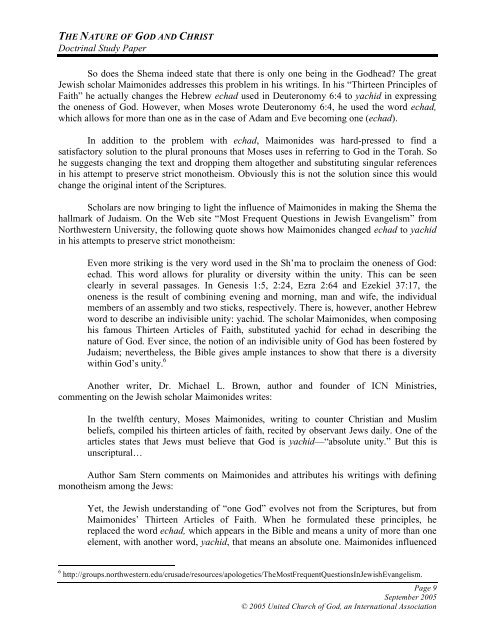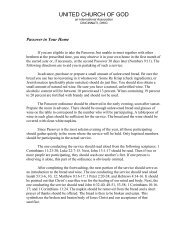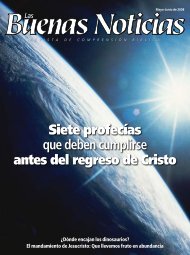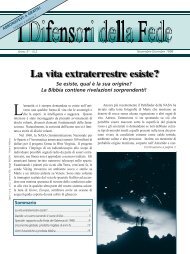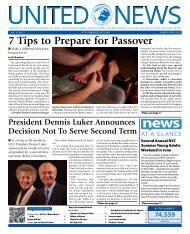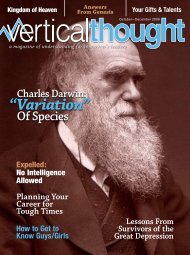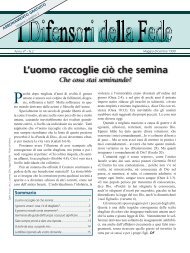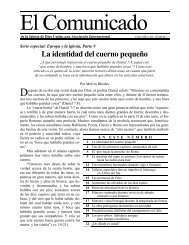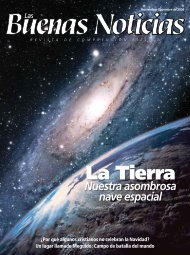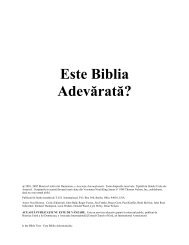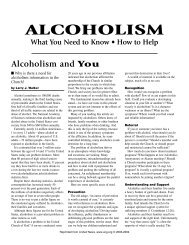THE NATURE OF GOD AND CHRISTDoctrinal Study Paperantecedent to verse 8 is clearly established in verse 7. It is Jesus <strong>Christ</strong> who will come in theclouds, it was Jesus <strong>Christ</strong> who was pierced <strong>and</strong> died for the sins <strong>of</strong> the world. Thus, He is the“Alpha <strong>and</strong> Omega” <strong>of</strong> verse 8.In reading the book <strong>of</strong> Revelation one should keep in mind that Jesus <strong>Christ</strong> is therevelator <strong>and</strong> the principal spokesman. In verse 10 John hears a voice like a trumpet <strong>and</strong> thevoice states, “I am the Alpha <strong>and</strong> the Omega, the First <strong>and</strong> the Last.” John then turns to see thevoice that was speaking <strong>and</strong> sees seven golden lampst<strong>and</strong>s with one like the Son <strong>of</strong> Man walkingin the midst <strong>of</strong> them with seven stars in His right h<strong>and</strong> <strong>and</strong> out <strong>of</strong> His mouth went a sharp twoedgedsword. John is so shaken by the vision that he falls as dead before the one who isspeaking, <strong>and</strong> the one speaking instructs John not to fear. <strong>The</strong>n the one speaking clearlyidentifies Himself saying, “I am He who lives, <strong>and</strong> was dead, <strong>and</strong> behold, I am aliveforevermore. Amen. And I have the keys <strong>of</strong> Hades <strong>and</strong> <strong>of</strong> Death” (Revelation 1:10-18).Only <strong>Christ</strong> could make the claim that He was dead <strong>and</strong> is now alive. Later in the book <strong>of</strong>Revelation John is inspired to write, “I am the Alpha <strong>and</strong> the Omega, the Beginning <strong>and</strong> the End,the First <strong>and</strong> the Last” (Revelation 22:13). “I, Jesus, have sent My angel to testify to you thesethings in the churches. I am the Root <strong>and</strong> the Offspring <strong>of</strong> David, the Bright <strong>and</strong> Morning Star”(verse 16). Clearly, the contextual <strong>and</strong> internal evidence demonstrate the term “Alpha <strong>and</strong>Omega” in the book <strong>of</strong> Revelation is referring to Jesus <strong>Christ</strong>.Moreover, even if one argues that Revelation 1:8 is referring to <strong>God</strong> the Father—the factremains that Jesus <strong>Christ</strong> also identifies Himself as, “I am the Alpha <strong>and</strong> the Omega, …the First<strong>and</strong> the Last.” Thus, Jesus’ clear statements in the book <strong>of</strong> Revelation make it abundantly clearthat He exists in eternity.<strong>The</strong> Shema <strong>and</strong> the “Oneness” <strong>of</strong> <strong>God</strong><strong>The</strong> Shema is the fundamental confession <strong>of</strong> the Jewish religion. “Hear, O Israel: <strong>The</strong>LORD our <strong>God</strong> is one [Hebrew, echad] LORD” (Deuteronomy 6:4, King James Version). <strong>The</strong>Shema is not a prayer but rather a “confession <strong>of</strong> faith or creed.” 4 It is seen as the creed thatproclaims the oneness <strong>and</strong> uniqueness <strong>of</strong> <strong>God</strong>. To the Jews the Shema is not only an “assertion <strong>of</strong>monotheism, it is also an assertion <strong>of</strong> the numerical oneness <strong>of</strong> <strong>God</strong> which is contradictory to the<strong>Christ</strong>ian view <strong>of</strong> the Trinity <strong>of</strong> the <strong>God</strong>head.” 5Jesus came proclaiming a controversial <strong>and</strong> revolutionary message about <strong>God</strong> <strong>and</strong> theway to eternal life. He proclaims He was sent to reveal the Father, which no man has ever seenor heard (John 1:18; 5:37). Furthermore, Jesus claims that He is the Son <strong>of</strong> <strong>God</strong>, the bread <strong>of</strong> lifesent by the Father from heaven (John 6:32-40). His message was particularly inflammatory to theJews, even though they were familiar with the Logos terminology—nevertheless, they rejectedthe idea <strong>of</strong> <strong>God</strong> becoming flesh. Any suggestion that <strong>God</strong> exists as more than one being, or that ahuman being could be <strong>God</strong> in the flesh, was viewed by most <strong>of</strong> the Jewish sects as blasphemy.4 G.W. Bromily, <strong>The</strong> International St<strong>and</strong>ard Bible Encyclopedia, 1988, Vol. 4, p. 469.5 Frank E. Gabelein, <strong>The</strong> Expositor’s Bible Commentary, 1992, Vol. 4, p. 69.Page 8September 2005© 2005 <strong>United</strong> <strong>Church</strong> <strong>of</strong> <strong>God</strong>, an International Association
THE NATURE OF GOD AND CHRISTDoctrinal Study PaperSo does the Shema indeed state that there is only one being in the <strong>God</strong>head? <strong>The</strong> greatJewish scholar Maimonides addresses this problem in his writings. In his “Thirteen Principles <strong>of</strong>Faith” he actually changes the Hebrew echad used in Deuteronomy 6:4 to yachid in expressingthe oneness <strong>of</strong> <strong>God</strong>. However, when Moses wrote Deuteronomy 6:4, he used the word echad,which allows for more than one as in the case <strong>of</strong> Adam <strong>and</strong> Eve becoming one (echad).In addition to the problem with echad, Maimonides was hard-pressed to find asatisfactory solution to the plural pronouns that Moses uses in referring to <strong>God</strong> in the Torah. Sohe suggests changing the text <strong>and</strong> dropping them altogether <strong>and</strong> substituting singular referencesin his attempt to preserve strict monotheism. Obviously this is not the solution since this wouldchange the original intent <strong>of</strong> the Scriptures.Scholars are now bringing to light the influence <strong>of</strong> Maimonides in making the Shema thehallmark <strong>of</strong> Judaism. On the Web site “Most Frequent Questions in Jewish Evangelism” fromNorthwestern University, the following quote shows how Maimonides changed echad to yachidin his attempts to preserve strict monotheism:Even more striking is the very word used in the Sh’ma to proclaim the oneness <strong>of</strong> <strong>God</strong>:echad. This word allows for plurality or diversity within the unity. This can be seenclearly in several passages. In Genesis 1:5, 2:24, Ezra 2:64 <strong>and</strong> Ezekiel 37:17, theoneness is the result <strong>of</strong> combining evening <strong>and</strong> morning, man <strong>and</strong> wife, the individualmembers <strong>of</strong> an assembly <strong>and</strong> two sticks, respectively. <strong>The</strong>re is, however, another Hebrewword to describe an indivisible unity: yachid. <strong>The</strong> scholar Maimonides, when composinghis famous Thirteen Articles <strong>of</strong> Faith, substituted yachid for echad in describing thenature <strong>of</strong> <strong>God</strong>. Ever since, the notion <strong>of</strong> an indivisible unity <strong>of</strong> <strong>God</strong> has been fostered byJudaism; nevertheless, the Bible gives ample instances to show that there is a diversitywithin <strong>God</strong>’s unity. 6Another writer, Dr. Michael L. Brown, author <strong>and</strong> founder <strong>of</strong> ICN Ministries,commenting on the Jewish scholar Maimonides writes:In the twelfth century, Moses Maimonides, writing to counter <strong>Christ</strong>ian <strong>and</strong> Muslimbeliefs, compiled his thirteen articles <strong>of</strong> faith, recited by observant Jews daily. One <strong>of</strong> thearticles states that Jews must believe that <strong>God</strong> is yachid—“absolute unity.” But this isunscriptural…Author Sam Stern comments on Maimonides <strong>and</strong> attributes his writings with definingmonotheism among the Jews:Yet, the Jewish underst<strong>and</strong>ing <strong>of</strong> “one <strong>God</strong>” evolves not from the Scriptures, but fromMaimonides’ Thirteen Articles <strong>of</strong> Faith. When he formulated these principles, hereplaced the word echad, which appears in the Bible <strong>and</strong> means a unity <strong>of</strong> more than oneelement, with another word, yachid, that means an absolute one. Maimonides influenced6 http://groups.northwestern.edu/crusade/resources/apologetics/<strong>The</strong>MostFrequentQuestionsInJewishEvangelism.Page 9September 2005© 2005 <strong>United</strong> <strong>Church</strong> <strong>of</strong> <strong>God</strong>, an International Association


